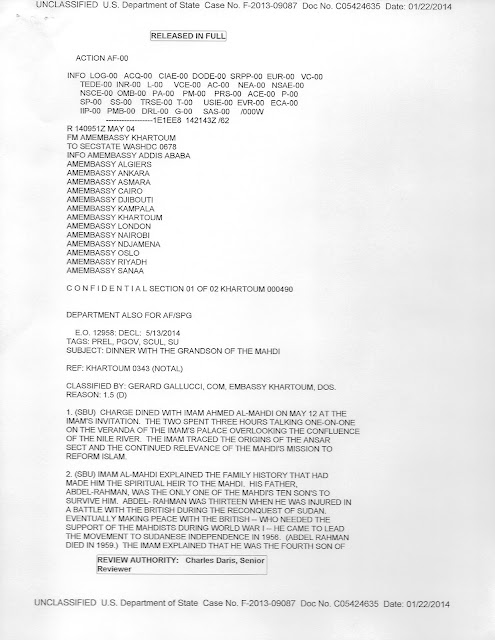January
27: Well, no snow or
ice here except for the cubes in my drink. Just came up from having
a nightcap with my visiting Marine BG. Nice evening talking pro to
pro. Evening is quite nice with pleasant chill in the air. Turns
out too that his Marine bodyguard was the deputy commander of the
Marine contingent in Brasilia. He remembers the day we took the
picture of Andy in full regalia!
Shit
happening in and about Darfur. Washington is ready to jump in head
first and I'm trying to point out that the pool might not have as
much water as they think.
January
28: Last night was
quite cool but had to get up early to see off my guest. Tonight I am
too tired to write or open the windows. Day ended with 3 1/2 hour
intense meeting with Assistant President. Was supposed to be at pizza
night with staff. This weekend will last 8 days with Eid. Rest
then.
January
30: The weather has
been quite nice since I got back from holidays. The
evenings are cool and the temperature falls to the lower 60 by early
morning. Over the weekend, we are supposed to hit the 50s. This is
open window weather and I do. Even during the day, in the office, I
open the windows and the breeze makes it comfortable all day. (I'm
on the 6th floor and can see to both Nile Rivers.) Not for years
have I been able to open the windows in the office. Very nice.
With
windows open, the air cools nicely in my house. I also get the
smells of the city. Most every night, this includes the smell of
burning garbage but is bearable and passes quickly. One morning this
week, it was so bad it woke me and I put on a face mask that I has
been reserving for the sand storms. But windows open is too good to
pass up. Locals say it'll only last to February.
With
the windows open, I hear lots of things. At night I hear sometimes
the bass rhythms of Arab music. This morning as I was waking, I
heard several different kinds of birds singing. The early morning
sounds start earlier. I hear the night trains and their whistles as
they pull into Khartoum Station. The first call to prayer is around
5:30. I can sleep through that but usually stir and then go back to
sleep. For some reason, not all the mosques use the same schedule
and there seems to be a second call around six. This week, perhaps
because of the Hajj (pilgrimage to Mecca), the first call to prayer
also seems to come with a chorus of some kind. There is much I don't
know about Islam.
A
boy's school sits just down the block from me. The boys all wear
green pajamas (they look like pajamas to me). They start school
pretty early. Well, the morning sounds include what I have taken to
calling the Daily Harangue. Remember the school assemblies of old?
Well, these may be like them. A voice, on a big load speakers,
starts speaking something that sounds like the call to prayer. Very
pleasant to listen to, almost like singing. But then he switches
into the voice I imagine the Ayatollahs use to excite the faithful to
slaughter the infidels. This goes on for some time and actually has
convinced me not to go outside during it. Then as suddenly as it
began, the harangue stops and the voice assumes the tome and cadence
of your high school principal. When the daily is over, I know it's
time to get up. Sort of a Khartoum alarm clock. I'll miss it when
it's time to go back to AC.


















